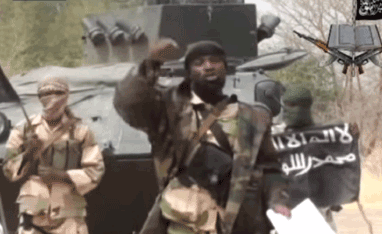The shocking revelation last week by former Chief of Defence Staff, Alex Badeh, that the Armed Forces went into war against Boko Haram without appropriate equipment was an eye-opener.
Worse still, his admission that the forces lacked the motivation to fight the invisible enemies embedded in the local populace raises eye brows about why they waged the war they cannot win.
Some 579 soldiers are the latest batch of mutineers, among others, facing court martial or on death row.
Thus, it is time for President Muhammadu Buhari to review thoroughly, the preparation, conduct and outcome of the war and also free those facing court martial.
All the recent extra preparation at high cost may come to naught if the troops are not well-kitted with equal or superior weapons, equipment and tactics to confront and defeat the insurgents in a war with guerrilla frontlines and a nebulous exit strategy.
The launch last month of the N’djamena-based multi-nation task force with troops from Nigeria, Chad, Niger Republic, Cameroon and Benin Republic may hem in the jihadists who hopped across borders to hide in neighbouring countries after their destructive attacks on military and civilian targets in Nigeria.
Again, the relocation from Abuja of the military High Command and Control Centre to Maiduguri, the epicentre of the insurgency, may also provide the morale booster to the troops on the frontlines.
The six-year insurgency has left at least 17,000 dead, mostly civilians, and one million driven out of their homes into internally displaced person (IDP) camps in inhospitable conditions. Experts speculate that dejected camp dwellers are soft targets for recruitment as suicide bombers.
The security services have failed to identify, let alone rescue the 219 Chibok schoolgirls kidnapped on April 14 last year, some 476 days counted so far by #BringBackOurGirls activists.
It is much harder to identify and kill or capture the estimated 3,000 Boko Haram insurgents, their international “IS” supporters and local surrogates. There is no miracle in war: Only adequate preparation, logistics, training and motivation of troops guarantee victory.
These were lacking in the anti-insurgency combat until a year ago.
Former National Security Adviser, Sambo Dasuki, listed some new game-changer equipment acquired as Alpha jets, armoured personnel carriers, mine-resistant ambush protected (MRAP) vehicles, advanced artillery, arms and ammunition, surveillance drones, T72 multi-purpose tanks and re-modified F7 supersonic jet fighters.
All these helped the well-armed troops who have body armour for protection against shrapnel and small arms fire to rout Boko Haram from 22 local governments they once named their Caliphate.
The weapons were bought from China, France, India and Russia, among others, after the scandal of black market arms acquisition left the Goodluck Jonathan government with a confiscated $15 million by South Africa.
The United States and its Western allies are ready to supply weapons to Nigeria once again, but are the officers and men going to go through extended training periods to master these equipment?
Pilots of 1955 warplanes are unsuited for modern automated jets without retraining.
At the core of the dispute with the West was the grudge that the Nigerian military committed human rights atrocities against civilian populations in the North East, mainly in reprisals against Boko Haram’s equally atrocious attacks against the military and civilians.
Brutality against beleaguered civilians made them refuse to betray the insurgents to soldiers, making the end of the war and victory for the military far from certain.
Left out of the preparation so far is the Defence Industries Corporation (DICON). If it was producing bullets, troops would not have complained that they were given 30 bullets each to confront Boko Haram firing 600 rounds per minute with sub-machine guns.
Legislative support for the Jonathan administration was strong. From the extra-judicial murder of Boko Haram leader, Mohammed Yusuf, by the police in 2009, which radicalised the group, to the declaration of the state of emergency in Adamawa, Borno and Yobe states in May, 2012, followed by the declaration of war against the sect on May 29 last year, Jonathan had all the legislative support he needed to win the war.
But he bungled it all.
The N4 trillion voted for the war, amid accusations of corruption in the military, did not trickle down to the troops on the frontlines. Hence their complaints that their welfare was poor, including food rations.
A country which does not take good care of its soldiers is not worth dying for.
With Badeh’s admission confirming most of the 636 court martial cases and 54 others on death row, there is no need to continue with their prosecution since it would have been suicidal for them to obey the order to go into action ill-equipped and badly-motivated.
Former Chief of Army Staff, Kenneth Minimah, says his sanctioning of hundreds of soldiers who deserted and betrayed operations to the insurgents to ambush troops during ‘Operation Zaman Lafiya’ has helped to rekindle the fighting spirit in the military. Maybe!
We do not condone indiscipline in the military hierarchy. But certainly if as many as nearly 700 officers and men have to be court-martialled for mutiny in one war, then definitely something went wrong with the system.
Hence our call for an urgent review of the conduct of the Armed Forces in the war to date.











